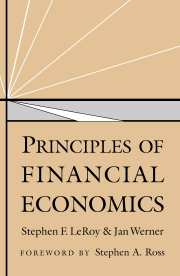Book contents
- Frontmatter
- Contents
- Foreword
- Preface
- Part One Equilibrium and Arbitrage
- 1 Equilibrium in Security Markets
- 2 Linear Pricing
- 3 Arbitrage and Positive Pricing
- 4 Portfolio Restrictions
- Part Two Valuation
- Part Three Risk
- Part Four Optimal Portfolios
- Part Five Equilibrium Prices and Allocations
- Part Six Mean-Variance Analysis
- Part Seven Multidate Security Markets
- Part Eight Martingale Property of Security Prices
- Index
3 - Arbitrage and Positive Pricing
Published online by Cambridge University Press: 05 September 2012
- Frontmatter
- Contents
- Foreword
- Preface
- Part One Equilibrium and Arbitrage
- 1 Equilibrium in Security Markets
- 2 Linear Pricing
- 3 Arbitrage and Positive Pricing
- 4 Portfolio Restrictions
- Part Two Valuation
- Part Three Risk
- Part Four Optimal Portfolios
- Part Five Equilibrium Prices and Allocations
- Part Six Mean-Variance Analysis
- Part Seven Multidate Security Markets
- Part Eight Martingale Property of Security Prices
- Index
Summary
Introduction
The principle that there cannot exist arbitrage opportunities in security markets is one of the most basic ideas of financial economics. Whether there exists an arbitrage opportunity or not depends on security prices. We show in this chapter that, if security prices exclude arbitrage, then the payoff pricing functional is strictly positive. Further, exclusion of arbitrage is necessary (and sufficient, when consumption is restricted to be positive) for the existence of optimal portfolios for agents with strictly increasing utility functions. In particular, equilibrium prices exclude arbitrage opportunities when agents have strictly increasing utility functions.
Conditions on security prices under which there exists no arbitrage are derived in this chapter in special cases (complete markets or two securities). The complete characterization will be given in Chapter 5.
Arbitrage and Strong Arbitrage
A strong arbitrage is a portfolio that has a positive payoff and a strictly negative price. An arbitrage is a portfolio that is either a strong arbitrage or has a positive and nonzero payoff and zero price. Formally, a strong arbitrage is a portfolio h that satisfies hX ≥ 0 and ph < 0, and an arbitrage is a portfolio h that satisfies hX ≥ 0 and ph ≤ 0 with at least one strict inequality.
It is possible for a portfolio to be an arbitrage but not a strong arbitrage:
Example 3.2.1 Let there be two securities with payoffs x1 = (1, 1) and x2 = (1, 2) and prices p1 = p2 = 1.
- Type
- Chapter
- Information
- Principles of Financial Economics , pp. 22 - 32Publisher: Cambridge University PressPrint publication year: 2000



